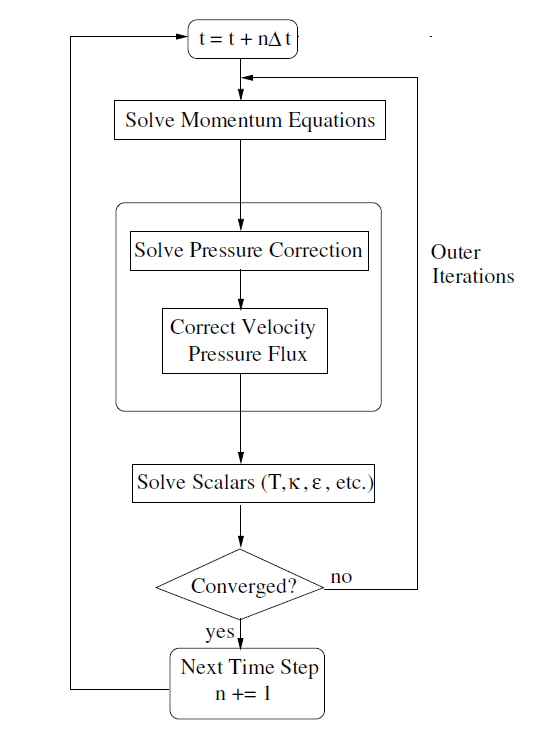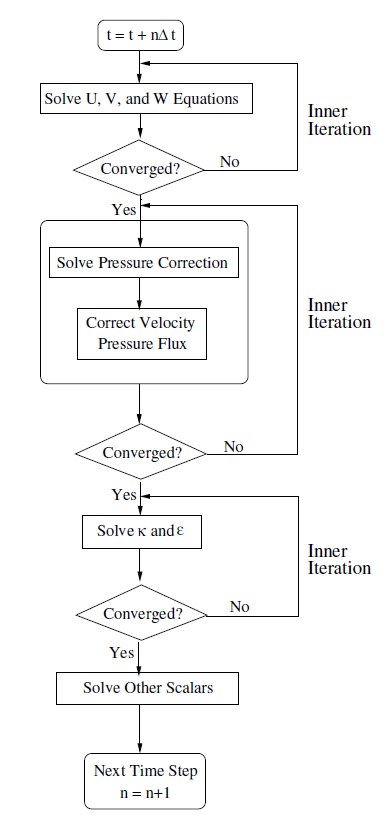For time-dependent flows, the discretized form of the generic transport equations is of the following form:
(23–68) |
|
where | |
|
| |
|
| |
|
| |
|
| |
|
| |
|
| |
|
|
The temporal discretization of the transient derivative in the Equation 23–68 is described in Temporal Discretization, including first-order and second-order schemes in time. The pressure-based solver in Ansys Fluent uses an implicit discretization of the transport equation (Equation 23–68). As a standard default approach, all convective, diffusive, and source terms are evaluated from the fields for time level n+1.
(23–69) |
In the pressure-based solver, the overall time-discretization
error is determined by both the choice of temporal discretization
(for example, first-order, second-order) and the manner in which the
solutions are advanced to the next time step (time-advancement scheme).
Temporal discretization introduces the corresponding truncation error; ,
, for first-order and second-order, respectively.
The segregated solution process by which the equations are solved
one by one introduces splitting error. There are two approaches to
the time-advancement scheme depending on how you want to control the
splitting error.
In the iterative scheme, all the equations are solved iteratively, for a given time-step, until the convergence criteria are met. Thus, advancing the solutions by one time-step normally requires a number of outer iterations as shown in Figure 23.1: Overview of the Pressure-Based Solution Methods and Figure 23.7: Overview of the Iterative Time Advancement Solution Method For the Segregate Solver. With this iterative scheme, non-linearity of the individual equations and inter-equation couplings are fully accounted for, eliminating the splitting error. The iterative scheme is the default in Ansys Fluent.
The standard fully-implicit discretization of the convective
part of Equation 23–69 produces nonlinear terms in the resulting equations. In addition,
solving these equations generally requires numerous iterations per
time step. As an alternative, Ansys Fluent provides an optional way
to discretize the convective part of Equation 23–68 using the mass flux
at the cell faces from the previous time level .
(23–70) |
The solution still has the same order of accuracy but the nonlinear character of the discretized transport equation is essentially reduced and the convergence within each time step is improved.
The Frozen Flux Formulation option is accessible from the Solution Methods dialog box.
Important: This option is only available for single-phase transient problems that use the pressure-based iterative solver and do not use a moving/deforming mesh model.
The iterative time-advancement scheme requires a considerable amount of computational effort due to a large number of outer iterations performed for each time-step. The idea underlying the non-iterative time-advancement (NITA) scheme is that, in order to preserve overall time accuracy, you do not really need to reduce the splitting error to zero, but only have to make it the same order as the truncation error. The NITA scheme, as seen in Figure 23.8: Overview of the Non-Iterative Time Advancement Solution Method, does not need the outer iterations, performing only a single outer iteration per time-step, which significantly speeds up transient simulations. However, the NITA scheme still allows for an inner iteration to solve the individual set of equations.
For single phase flows, Ansys Fluent offers two versions of NITA schemes; the non-iterative fractional step method (FSM) ([28], [153], [208], and [209]) and the non-iterative PISO method [274]. Both NITA schemes are available for first-order and second-order time integration.
For Eulerian multiphase flows, the non-iterative PC Simple scheme is available in Ansys Fluent. Non-iterative PC Simple is a hybrid of the PC Simple and PISO schemes.
Important:
In general, the NITA solver is not recommended for highly viscous fluid flow.
The NITA solver is not recommended for flows with a strong dependence of fluid density on species concentration.




